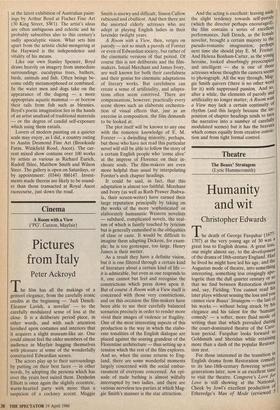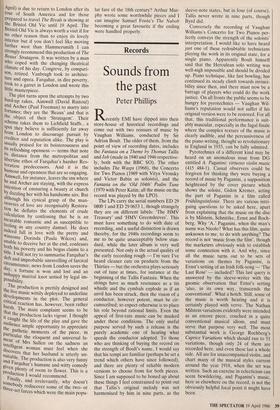Theatre
The Beaux' Stratagem (Lyric Hammersmith)
Humanity and wit
Christopher Edwards
The death of George Farquhar (1671- 1707) at the very young age of 30 was a great loss to English drama. A great loss' one might almost say, to the development of the drama of 18th-century England. Had he lived he might have led his age, and the Augustan mode of theatre, into something interesting, something less cringingly apo- logetic than the dull quarter century or so that we find between Restoration drama and, say, Fielding. You cannot read his later plays without sensing the loss and you cannot view Beaux' Stratagem — the last of his works — without being struck by his elegance and his talent for the `humane c comedy' — a softer, more fluid mode of writing than that which prevailed during the court-dominated theatre of the Caro- lean period. Farquhar looks forward to Goldsmith and Sheridan while retaining more than a dash of the popular Restora- tion zest.
For those interested in the transition la English drama from Restoration comedy to its late-18th-century flowering several generations later, now is an excellent time to visit the theatre. Congreve's Love for Love is still showing at the National, Cheek by Jowl's excellent production of Etheredge's Man of Mode (reviewed 5 April) is due to return to London after its tour of South America and for those prepared to travel The Rivals is showing at the Bristol Old Vic until 19 April. The Bristol Old Vic is always worth a visit if for no other reason than to enjoy its lovely interior but if you don't feel like moving farther west than Hammersmith I can strongly recommend this production of The Beaux' Stratagem. It was written by a man who coped with the changing theatrical climate of his day. Congreve, by compari- son, retired. Vanbrugh took to architec- ture and opera. Farquhar, in dire poverty, took to a garret in London and wrote this little masterpiece. The plot turns upon the attempts by two hard-up rakes, Aimwell (David Rintoul) and Archer (Paul Freeman) to marry into fortunes; they are the 'Beaux' and that is the object of their 'Stratagem'. Their scheme takes them to Lichfield Staffs., a spot they believe is sufficiently far away from London to discourage pursuit by creditor and reputation alike. The play is usually praised for its boisterousness and its refreshing openness — terms that note its distance from the metropolitan and libertine ethos of Farquhar's harsher Res- toration predecessors. And it is the humour and openness that are so engaging. Aimwell, for instance, leaves the inn where he and Archer are staying, with the express intention of ensnaring a beauty at church by dazzling her with his handsome airs. But although his cynical grasp of the man- oeuvres of love are recognisably Restora- tion he deflates the elements of crude calculation by confessing that he is an incurable romantic and as susceptible to feeling as any country damsel. He does indeed fall in love with the pretty and Winsome Dorinda (Paula Wilcox) and, unable to deceive her at the end, confesses both his poverty and his bogus claims to a title. I will not try to summarise Farquhar's deft and improbable unravelling of farcical circumstance; news from London saves the day, a fortune is won and lost and an unhappy marital knot untied by legal im- Possibility. The production is prettily designed and the live music wittily deployed to underline developments in the plot. The general critical reaction has, however, been rather harsh. The main complaint seems to be that the production lacks vigour. I thought it caught the life of the play and gave the audience ample opportunity to appreciate the pathetic moments of the piece, in particular the eloquent and universal la- ment of Mrs Sullen on the sadness an Intelligent woman must feel when she discovers that her husband is utterly un- suitable. The production is also very funny and Farquhar's humane and witty comedy given plenty of room to flower. This is a production I would recommend. s FlnallY, and irrelevantly, why doesn't three-act rediscover some of the two- or tnree-act farces which were the main popu- lar fare of the 18th century? Arthur Mur- phy wrote some worthwhile pieces and I can imagine Samuel Foote's The Nabob becoming a great favourite if the ending were handled properly.



















































 Previous page
Previous page